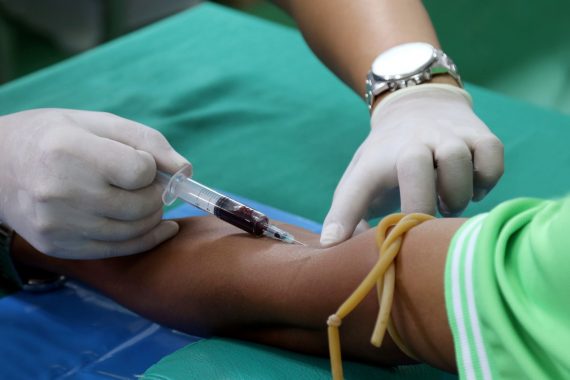Promising UK cancer blood test correctly diagnoses two-thirds of patients

A new blood test detecting over 50 types of cancer has shown promising results in a recent NHS clinical trial, according to researchers.
The SYMPLIFY study was set up in 2021 to trial the Galleri blood test on over 6,000 patients in England and Wales who had been referred by their GP for diagnostics following identification of potential cancer symptoms.
The results, which will be presented at the American Society of Clinical Oncology meeting in Chicago on Saturday, showed ‘strong performance’ of the multi-cancer early detection (MCED) test.
The study was run by the University of Oxford and supported by GRAIL, the US-based company that developed the Galleri MCED test.
Of the 5,461 evaluable patients, the test correctly identified two-thirds (66.3%) of those who were diagnosed with cancer through normal care procedures.
This sensitivity increased with age and late cancer stage, with 95.3% accuracy for stage IV cancer.
After a positive MCED test, Galleri correctly identified the origin site of the cancer in 85.2% of cases.
The NHS patients involved in the study were those who had been referred by their GP for urgent imaging, endoscopy or other diagnostic tests to investigate symptoms of potential gynaecological, lung, lower GI or upper GI cancer, or who had non-specific symptoms.
Alongside completing these investigations, patients provided a blood sample so that the MCED could be performed.
Cancer was diagnosed through usual NHS procedures in 368 patients, and the MCED detected a cancer signal in 323 people, 244 of whom had been diagnosed.
This means that 75.5% of those testing positive with Galleri were found to have cancer, and 2.4% of those testing negative were found to have cancer.
Professor Brian D. Nicholson, a GP, associate professor at the University of Oxford and co-lead investigator for the study, said ‘new tools’ are needed that can ‘expedite cancer diagnosis and potentially avoid invasive and costly investigations’.
Of the results, he added: ‘The high overall specificity, positive predictive value, and accuracy of the cancer signal detected and cancer signal origin prediction that was reported across cancer types in the SYMPLIFY study indicate that a positive MCED test could be used to confirm that symptomatic patients should be evaluated for cancer before pursuing other diagnoses.’
Dr David Crosby from Cancer Research UK said: ‘The findings from the study suggest this test could be used to support GPs to make clinical assessments, but much more research is needed in a larger trial to see if it could improve GP assessment, and ultimately patient outcomes.’
While this study showed a strong performance for the use of MCED with symptomatic patients, the NHS is also running a study with around 140,000 volunteers aged 50 to 77 to trial the Galleri test alongside existing cancer screening for asymptomatic patients.
Last week, some researchers argued the current prostate cancer screening system working, saying the UK should either put in place a ‘risk-based’ screening programme for prostate cancer or make it clear people should not have a PSA test without symptoms.
And in April, NHS England announced that people in deprived areas are now more likely to be diagnosed with lung cancer at an earlier stage, thanks to its targets screening programme with included ‘lung trucks’.
Pulse October survey
Take our July 2025 survey to potentially win £1.000 worth of tokens

Visit Pulse Reference for details on 140 symptoms, including easily searchable symptoms and categories, offering you a free platform to check symptoms and receive potential diagnoses during consultations.
Related Articles
READERS' COMMENTS [2]
Please note, only GPs are permitted to add comments to articles










The current cost of this one blood test is US$ 949, approx £800
That will quickly blow a few budgets!
It will be good when this organisation releases some publicly available peer reviewed data around efficacy.
The ability to identify that someone we know has cancer, has cancer is something the world has been crying out for…